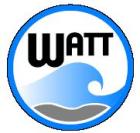
| PROJECT NAME | BioGeoChemistry of Tidal Flats |
| ACRONYM | BioGeoChemistry of Tidal Flats |
| STUDY REGION | East Frisian Wadden Sea |
| PRINCIPAL INVESTIGATOR | Jürgen Rullkötter |
| DURATION | January 1, 2001 - March 31, 2009 |
| PROJECT WEBSITE | Link to project website |
| LOICZ PROJECT DATABASE | Click here for more project information |
| PROJECT DESCRIPTION |
|
The investigations of the Research Group aim at a fundamental understanding of important processes in a tidal flat system. For this purpose, biogeochemical transformations on water-column-suspended particles, at the sediment-water interface and in the sediments will be studied. Considering the hydrodynamic conditions, the influence of the different processes on the material budgets will be determined.
A mathematical ecosystem model will be developed for the biogeochemical processes in the tidal flat sediments and at the sediment-water interface. On a higher level, a material budget will be established for a selected tidal flat area on the East Frisian North Sea coast (backbarrier tidal flat of Spiekeroog island).
The results of the experimental study of sediment transport will be described mathematically with a hydrodynamics model. In addition, a tight coupling of methods for analyzing nonlinear dynamic systems with ecological problems will be used to reveal how spatial, temporal and/or spatio-temporal structures are formed due to nonlinear interaction of reaction, diffusion and advection and if exceeding a critical threshold leads to the spontaneous formation of new structures or dynamics.
With this fundamental methodological contribution to the field of integrative modeling, the Research Group would like to take a significant step forward to the development of a comprehensive mathematical model of tidal flat systems which beyond the initially selected study area should be applicable also to other tidal flat areas and similarly complex systems.
The work of the Research Group is based on
the results of past ecosystem research projects in the same coastal area, but
in the analysis of the material budget and particularly in the integrative
modeling it will break new scientific ground due to the innovative
methodological concepts applied. |
| THE PROJECT RELATES TO THE FOLLOWING PRIORITY TOPICS AND SCIENTIFIC THEMES |
Priority Topics: 2 - Assess and predict impact of environmental change on coastal ecosystems |
Scientific Themes: 4 - Biogeochemical Cycles in Coastal and Shelf Waters |





